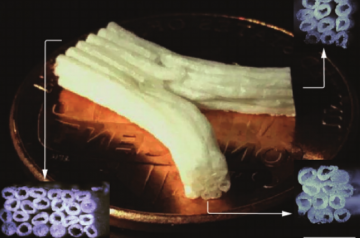
A major focus of Dr. Shahriari’s research has been on development of microchannel nerve guidance scaffolds for peripheral and spinal cord injury nerve regeneration. Microchannel scaffolds can accelerate nerve repair by guiding growing neurites and axons across injury sites, whose growth are influenced by geometry, chemical, mechanical and porous properties. She has performed both in vitro as well as in vivo tests to evaluate regrowth using these implanted scaffolds. Some of her work has focused on scaffolds based on polymers and hydrogels, and properties including degradability, open volume, and stiffness have been tuned to optimize properties.
In D. Shahriari, G. Loke, I. Tafel, S. Park, P. Chiang, Y. Fink, P. Anikeeva, Scalable Fabrication of Porous Microchannel Nerve Guidance Scaffolds with Complex Geometries, Adv. Mater. 2019, 31, 1902021 an approach to fabricating one version of these scaffolds is highlighted involving fiber drawing and salt leaching to produce highly porous and tunable cross section microchannels, conducive to encouraging neural regrowth. They were found to enhance growth compared to non-porous channels of similar geometry.
